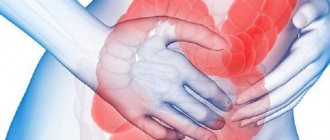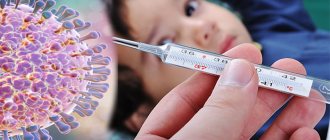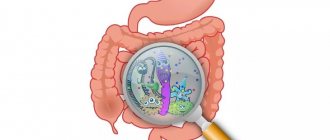Share this article on social networks
Diarrhea appears as loose stools and can be mild to severe and last from days to weeks. It all depends on the root cause.
Other symptoms of diarrhea may include:
- constant bowel movements (at least three times a day);
- abdominal cramps;
- abdominal pain;
- poorly controlled bowel movements;
- nausea.
Important! You may also experience fever, dizziness, or vomiting. These symptoms usually occur when an infection causes diarrhea.
Let's look at the typical duration of diarrhea, along with home remedies and signs when you should see a doctor.
Why does diarrhea occur and how long can it last?
Chronic diarrhea is diagnosed if the patient's stool has a watery consistency for 14 days or more. All patients who consult a doctor with such complaints are required to undergo a stool examination for worm eggs, a coprogram and an analysis for enterobiasis. The coprogram is a universal chemical method for examining feces, which allows one to identify signs of inflammatory and infectious processes, as well as symptoms of impaired absorption of various substances.
Coprogram. Norm
Infection with worms
Signs of worms in an adult
Symptoms of acute helminthic infestation from the gastrointestinal tract are quite pronounced and can manifest as prolonged diarrhea, vomiting, and nausea. If the number of parasites increases rapidly, worms of various sizes can exit through the anus and mouth along with feces and vomit. A man should also be wary of constant headaches, skin rashes, and frequent colds.
The drug Pirantel
IBS, according to most experts, is of a psychosomatic nature, although the exact causes of the pathology have not yet been established. The social and living conditions of a man, the degree of his social activity, and the state of the central and autonomic nervous system are of great importance. Irritable bowel syndrome can manifest as both chronic constipation and prolonged diarrhea, so it is important to know the symptoms of the pathology and the basics of treatment.
Symptoms of Irritable Bowel Syndrome
In addition to bowel dysfunction, the following signs may indicate IBS:
- painful cramps in the lower abdomen;
- flatulence, increased gas formation, "rumbling" in the stomach"
- false urge to have a bowel movement;
- no relief after bowel movements.
Causes, symptoms, diagnosis and treatment of irritable bowel syndrome
To treat IBS, a man will have to follow a diet that limits the consumption of foods containing high amounts of purines or puric acid. These are various nuts, seeds, raw vegetables (especially cabbage and sorrel), legumes, some types of cereals (oatmeal, barley). Alcoholic drinks, lemonades and carbonated mineral water should be completely excluded from the diet.
Treatment of irritable bowel syndrome
Among medications, the use of prebiotic cultures and probiotics is indicated. Enterol capsules and powder have a complex effect. The drug restores the intestinal microflora, stimulates the growth of its own beneficial flora, destroys pathogenic bacteria, and normalizes stool. The dosage for an adult male is 2 capsules per day. Duration of treatment is from 10 to 30 days.
Release form of the drug Enterol
Pancreatitis is an inflammation of the parenchymal tissue of the pancreas involving the mucous and submucosal layer. Chronic pancreatitis occurs in approximately 20% of men. The main risk group includes men who make mistakes in nutrition, abuse fatty and spicy foods, and alcoholic beverages.
Definition of pancreatitis
Exacerbation of the pathology leads to the appearance of pronounced symptoms, including:
- acute pain syndrome in the right hypochondrium;
- prolonged diarrhea with watery or foamy stools;
- profuse vomiting (may contain impurities of bile acids and lumps of undigested food);
- temperature increase.
One of the most serious consequences of pancreatitis is fibrosis of the pancreas - the proliferation of the connective fibers of the organ with the formation of scar elements. Diarrhea due to pancreatic fibrosis in men can last more than 20 days in a row.
Chair Chart
Infectious intestinal diseases are predominantly acute lesions of various segments of the large or small intestine, provoked by the active growth and reproduction of pathogenic flora in the intestinal lumen. The main causes of acute intestinal infections are consumption of expired and low-quality foods, poor heat treatment and viral diseases caused by viruses from the group of rotaviruses and enteroviruses.
Characteristics of diarrhea
Intestinal infections have severe symptoms and are manifested by fever, profuse vomiting, abdominal pain, intestinal spasms, and acute diarrhea. It is diarrhea that is considered one of the main manifestations of OCI: the patient’s stool becomes watery, mucus and foam appear in it, and a sharp putrid odor occurs. The number of bowel movements in a female dog can reach up to 10-12 times; the process itself is painful and does not bring relief after completion.
Causes of diarrhea
In most cases, diarrhea goes away completely within 5-7 days from the moment the first signs appear, but in some cases recovery can take up to 2 weeks or more (for example, with an enterovirus infection). This is a clinically serious condition requiring specialized care in a hospital setting.
The result of treatment for diarrhea depends on how correctly the cause of its occurrence is identified. This condition may be due to the following factors:
- Impaired intestinal motility.
- Poisoning.
- Acute or chronic gastrointestinal infections.
- Excessive overeating, diet errors.
- Parasitic diseases.
- Inflammatory processes and tumors of the gastrointestinal tract.
- Lack of digestive enzymes.
Additional factors that contribute to the occurrence of diarrhea are:
- Use of certain types of medications.
- Stress and neuroses.
- Insufficient personal hygiene.
- Reduced immunity.
- Pregnancy.
- Childhood.
- Sedentary lifestyle.
Whatever the cause, diarrhea requires adequate treatment.
Possible reasons
Diarrhea is a companion to many diseases of the gastrointestinal tract:
- Intestinal infections are the most common cause of diarrhea. They are caused by pathogenic bacteria (Shigella, Salmonella, Campylobacter, enteroinvasive Escherichia coli), viruses (roto- and noroviruses), Giardia and helminths.
- Irritable bowel syndrome is a neurofunctional disease of the digestive system, which is accompanied by stool disorders.
- Pathology of the pancreas. In chronic pancreatitis, the synthesis of enzymes involved in food digestion decreases: amylase, protease, lipase.
- Diseases of the liver and biliary tract. With an insufficient amount of bile, the breakdown of fats, proteins, and carbohydrates in the duodenum is disrupted.
- Drug-induced diarrhea. Stool upset is a side effect of iron, magnesium, and antibiotics.
- Intestinal dysbiosis - with a decrease in the number of bifidobacteria and lactobacilli, activation of opportunistic flora, food digestion worsens, and diarrhea occurs.
- Milk intolerance - with a lack of the lactase enzyme, the absorption of milk is impaired: bloating and diarrhea appear. Pathology often develops after intestinal infections.
- Celiac disease (gluten enteropathy) is intolerance to cereal protein. Under the influence of gluten, enterocytes (cells of the small intestine) are destroyed, autoimmune inflammation and prolonged diarrhea develop. The disease often begins after 30 years of age.
- Nonspecific ulcerative colitis and Crohn's disease are severe inflammation of the intestines with the formation of ulcerative defects.
- Intestinal cancer - diarrhea is provoked by radiation and chemotherapy, the tumor itself releases toxic substances that irritate the intestinal wall.
Origins of the problem
There are many causes and diseases that cause diarrhea; it is important to be able to distinguish “safe diarrhea” from complex diarrhea, which requires immediate medical attention. Diarrhea is a protective reaction of the body:
- on the introduction into the body of bacterial enterotoxins of certain infectious pathogens (shigella, salmonella, E. coli, rotaviruses, etc.);
- to take antibiotics (dysbacteriosis). Almost 1/4 of all patients on antibiotic therapy suffer from diarrhea, and most of all need help with diarrhea;
- for non-infectious gastrointestinal diseases;
- to allergic reactions (certain foods);
- to uncontrolled or improper use of medications, including weight loss products, which are usually based on relaxation of a person’s stool (4% of cases of chronic diarrhea);
- for internal functional disorders of the gastrointestinal tract (diarrhea after breakfast);
- for fear, other psychogenic factors (“bear disease”).
As can be seen from all the reasons described above, the treatment of diarrhea directly depends on the “scenario” in which the problem arose. How to cure diarrhea quickly so that the digestive system disorder causes minimal damage to the body?
When to see a doctor
Most often, diarrhea goes away within 1–2 days and there is no need to seek medical help to treat it. If diarrhea continues for 3-4 days, this is a reason to contact a specialist to clarify the cause. After conducting a series of diagnostic measures and making a diagnosis, the doctor will prescribe appropriate treatment.
You should consult a doctor if:
- Body temperature is higher than 38.5 °C.
- The presence of blood in the stool.
- Passing watery (foamy) stools up to 15 times a day.
- Dehydration of the body.
- Diarrhea is accompanied by impaired consciousness.
If, in addition to the listed symptoms, the patient has vomiting, bloating and a severe headache, you should immediately call an ambulance.
If diarrhea does not stop within a week and the patient does not seek medical help, it can cause death.
To protect yourself as much as possible from the occurrence of diarrhea, first of all you need to follow the rules of personal hygiene and heat treatment of food. In addition, it is important to monitor your diet, try to avoid overwork and stress, treat chronic diseases in a timely manner, and lead a healthy lifestyle.
- Presence of blood, pus, and large amounts of mucus in the stool.
- Unusual stool color. Black stool indicates gastric bleeding.
- Lack of positive dynamics within 2 days from the onset of the disease, persistence of fever and frequent loose stools.
- Tenesmus is a painful, non-productive urge to defecate. Tenesmus is one of the symptoms of dysentery.
- Large, watery stools more than 5 times a day.
- Age over 65 years. In older people, complications develop faster and chronic diseases worsen.
- Deterioration of health: severe thirst, rare urination, decreased blood pressure, muscle cramps, palpitations, irregular pulse, clouding of consciousness. If these symptoms occur, call an ambulance.
We recommend reading:
How does defecation occur in humans?
Stages of the disease
Diarrhea can occur every day for quite a long time. And if diarrhea lasts for a long time, one may suspect that a dangerous chronic disease is developing in the body.
There are three stages of pathology, taking into account the duration of the disease:
- acute diarrhea is observed for 7-10 days;
- prolonged diarrhea lasts 2-11 weeks;
- Chronic diarrhea can last from three months to one or more years.
If diarrhea does not go away for a long time, a full examination of the body is necessary to eliminate the problem. Below we will look at what factors can cause this unpleasant phenomenon.
A man's diarrhea does not go away for more than 1 month
There are many reasons that can cause stable stool liquefaction in an adult man. They can be associated both with poor nutrition and with severe diseases of the gastrointestinal tract, and less commonly, of the vascular and hematopoietic system. The most common pathologies with similar symptoms are listed in the table below.
| Disease | Image | What it is? |
| Enteritis | Inflammation of the mucous layer of the small intestine with signs of dystrophic and atrophic changes, in which the absorption and assimilation of nutrients is impaired | |
| Obstruction or atresia of the bile ducts | Obstruction of the bile ducts, occurring in 3-5% of men (mostly under the age of 30) | |
| Celiac disease | Intolerance to a complex protein that is part of the chemical composition of most grains (gluten) | |
| Ulcerative colitis | Chronic damage to the large intestine with signs of an inflammatory process that develops under the influence of external and genetic factors | |
| Atrophic gastritis | A disease of the stomach in which gradual atrophy of the mucous and submucosal layer of the gastric walls occurs. It is more often diagnosed in men over 45-50 years of age and is considered a precancerous condition. | |
| Lactase deficiency | Lactose intolerance due to congenital or acquired deficiency of lactase, a digestive enzyme that breaks down lactose | |
| Intestinal vasculitis | Inflammation of blood vessels, arteries and veins of various segments of the intestine | |
| Intestinal ischemia | Poor circulation in the intestinal vessels, associated with blockage or narrowing of their lumen, as well as the formation of blood clots (intestinal thrombosis) | |
| Polyposis | Tumor process in the mucous layer of the small and large intestines, as well as the rectum |
Common signs of diarrhea
Treatment of chronic diarrhea requires an integrated approach, so using one drug to get rid of the problem will not be enough. The basis of treatment in all cases is symptomatic therapy drugs from the group of opioid receptor agonists. Drugs in this group are listed in the table below.
| Drug name | Image | In what form is it produced? | approximate cost |
| "Imodium" | Capsules | 245 rubles | |
| "Loperamide" | Capsules and tablets | 10 rubles | |
| "Diara" | Chewable tablets | 88 rubles | |
| "Lopedium" | Tablets and capsules | 32 rubles |
The listed drugs can be used for the treatment of functional diarrhea in allergic and alimentary gastroenteritis, malabsorption in the intestine, infectious intestinal pathologies, and metabolic diseases. Short courses can be used for stable diet disorders, as well as digestive disorders caused by a change in the usual diet.
Treatment of diarrhea
The use of bifid drugs provides a good therapeutic effect. They normalize the composition of the intestinal microflora and restore all its functions. Adult men can use one of the following medications (read the instructions before use):
- "Acipol";
- "Linex";
- "Normaze";
- "Bifidumbacterin";
- "Bifiform".
Medicines to treat diarrhea
To prevent dehydration with frequent diarrhea, it is recommended to drink plenty of fluids and use concentrated saline solutions, for example, Hydrovita or Regidron.
What medications to take
There are a number of remedies whose effectiveness has been proven over time.
If diarrhea develops, the following medications are prescribed:
- Sorbents that remove toxins, adsorb gases, reduce flatulence. The list of drugs includes Smecta, Polyphepan, De-Nol, Calcium salts.
- As drugs to reduce the production of intestinal mucus. They are taken throughout the course of the pathology. For Crohn's disease, the hormones Prednisolone and Metypred are used.
- Herbal medicines, which include oak bark, alder cones and bird cherry berries, cinquefoil root and chamomile. Infusions and decoctions are prepared from plants.
- Enzymes are necessary when the disorder is associated with pathologies of the digestive system; Creon, Mezim, Festal and Pancitrate can be prescribed.
- Antispasmodics improve peristalsis, these include No-Shpu, Papaverine.
Antimicrobial drugs are prescribed for intestinal infections; Arbidol is most often used.
Also among the drugs that help stop the effects of pathology on the body are intestinal antiseptics. Probiotics are indicated in all cases of manifest disease. These are Enterol, Hilak-Forte, Linex and others.
First aid for diarrhea
Start treatment at the first signs of the disease:
- Enterosorbents. For an adult, dilute 1-2 tablespoons of Polysorb powder in 150 ml of water, take every hour for the first 5-6 hours.
- If there is no fever, chills, nausea, and stool disorders are caused by poor diet, take Imodium: 2 capsules immediately, then one after each episode of diarrhea.
- If you have repeated diarrhea, start rehydration: drink water, prepare a solution of Regidron.
- For abdominal pain, take an antispasmodic - 2 No-Spa tablets.
Diagnosis of chronic diarrhea
With prolonged diarrhea, men need to undergo stool tests for parasitic infections, as well as a coprogram. This is one of the types of scatological research, which allows you to determine the chemical and bacteriological composition of feces and identify signs of infectious-inflammatory, parasitic and tumor processes.
How to distinguish diarrhea from normal
A coloproctologist treats intestinal diseases (a more specialized specialist is a proctologist - a doctor who treats pathologies of the rectum). If inflammation of the stomach or damage to the initial segments of the large intestine is suspected, a consultation with a gastroenterologist is indicated. If a man has chronic diseases of the endocrine system, for example, diabetes, treatment is prescribed together with an endocrinologist.
When going to the hospital, a man should understand that he may have to undergo an examination by a proctologist or a rectal examination using hardware methods, for example, irrigoscopy, colonoscopy, sigmoidoscopy. When performed correctly, these procedures do not cause pain, but to facilitate insertion of the endoscope, the patient must completely relax the anal muscles.
Types of diarrhea by development mechanism
Treatment
Treatment for diarrhea should be comprehensive.
The goal of dietary nutrition for prolonged diarrhea is to reduce intestinal motility and create conditions for the restoration of damaged cells.
Treatment of loose stools in an adult who has been walking for a long time depends on the symptom of which disease chronic diarrhea is in this case.
- Irritable bowel syndrome is treated with drugs that inhibit peristalsis, such as Loperamide, and the analogues Imodium and Lopedium. But to achieve a faster and more lasting result, it is necessary to add sedatives to the therapy, which will help normalize the patient’s psycho-emotional state.
- Ulcerative colitis and Crohn's disease require long-term and serious treatment, which should be carried out under the supervision of a competent doctor. Therapy for such diseases includes the use of anti-inflammatory and hormonal drugs. The latter are also used to eliminate foci of inflammation.
- If chronic diarrhea is caused by dysbiosis, a course of probiotics and prebiotics will be prescribed to get rid of it. These drugs will populate the intestines with beneficial microflora, and, as a result, the digestion process will be improved and diarrhea will go away. Here are some examples of such drugs: Linex, Bifidumbacterin, Bifiform, Hilak-forte
- Intestinal infections, along with agents that inhibit peristalsis, are treated with antibiotics, antiviral and antifungal drugs, depending on the pathogen. You cannot treat yourself, since only a doctor can name the causative agent of the disease after reviewing your tests.
- If prolonged diarrhea is due to intolerance to a particular product, you need to eliminate it from your diet completely. Milk and dairy products for lactose intolerance, and cereals for gluten intolerance.
- If the problem arose due to the general diet, adjustments must be made to it. Vegetables and fruits on your table should undergo heat treatment, so they will weaken less. Eliminate spicy, fatty and heavy foods - all this irritates the intestinal walls and only increases peristalsis. “Astringent” fruits, such as quince, pear, and persimmon, are acceptable. On the topic: what can an adult eat if they have diarrhea?
- Quit smoking and alcohol
For whatever reason you have diarrhea, you need to drink solutions that maintain the balance of water, salts and electrolytes. You can buy Regidron and Ringer's solution at the pharmacy, or you can prepare them at home, yourself. To do this, dissolve a tablespoon of sugar, a teaspoon of salt and half a teaspoon of salt in a liter of water.
You will also learn about what malfunction in the body green diarrhea indicates on our website.
Diarrhea lasts more than seven days
If diarrhea lasts for a week or more, it is necessary to call a specialist at home to determine the reasons that provoked this phenomenon. Common causative agents of this type of pathology are food allergies or intolerance to any foods, disrupted diet, or an acute reaction to taking a pharmaceutical drug.
The list of reasons primarily includes:
- Food intoxication.
- Bacterial enterocolitis.
- Viral gastroenteritis.
- Penetration of helminths into the body.
- Long-term use of certain medications.
Another factor that can provoke a problem is the so-called “traveler's diarrhea,” which develops while visiting exotic countries.
Nutrition for long-term diarrhea
Correction of the diet is one of the most important tasks in the complex treatment of prolonged diarrhea. For men with similar symptoms, split meals and reduced portion sizes are recommended. It is necessary to exclude any irritating products and substances from the menu: vinegar, spices, flavorings. It is advisable to prepare food using gentle methods (stewing, baking, boiling).
For unspecified frequent diarrhea, it is recommended to limit the consumption of whole milk, spices, fatty sauces, and fresh fruits. Among vegetables, it is necessary to reduce the consumption of cucumbers, zucchini, and radishes to a minimum. Coffee and alcoholic drinks are allowed in small quantities and strictly outside the period of exacerbation.
Principles of diet for diarrhea
To alleviate the condition during the period of acute diarrhea, the diet should consist of sterilized applesauce, boiled rice, bananas, wheat crackers without adding flavorings or dyes. Meat should be consumed in the form of soufflés, meatballs and casseroles. Boiled pieces should be finely chopped using a meat grinder or blender.











